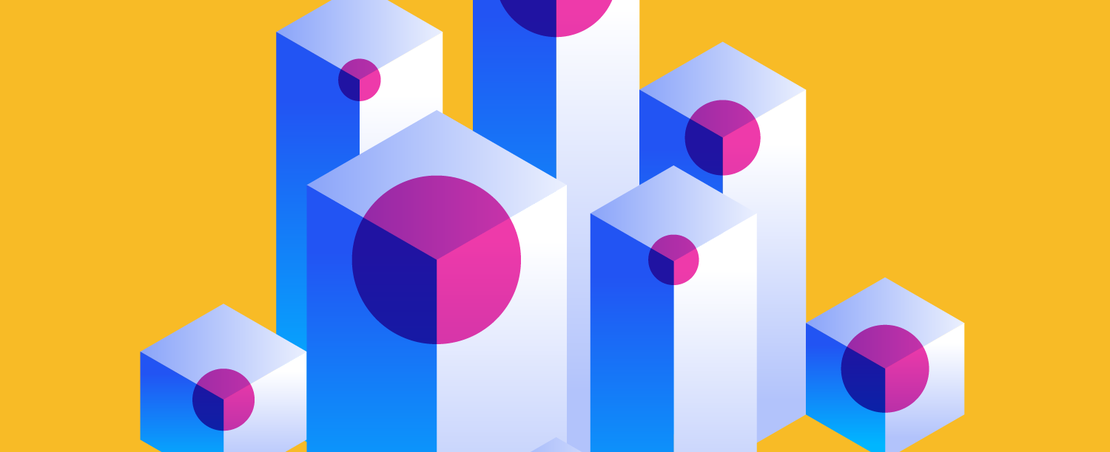
Make better use of data in your city
Data has the potential to improve how city decisions are made and city services are delivered. The benefits include improved transparency and accountability, better decision making and increased innovation.
- Transparency and accountability: A city should be open to its communities; sharing data, plans and processes and inviting citizens, businesses and charities into decision making. This helps create cities that work better for everyone.
- Better decision making: A better understanding of the data that is collected across a city can lead to a better understanding of its communities and their needs or challenges. With this, better decisions can be made based on better insight into problems and the likely impacts of different actions for addressing them
- Innovation: A combination of open data and openness around city planning and policy-making can lead to a more open and innovative ecosystem. Public-private partnerships, startup hubs, and challenge programmes can help foster a more collaborative approach to problem solving in a city – working across communities in the public, private and third sectors.
What are Open Cities?
Challenges for smart cities
Cities are expanding their use of data, across the data spectrum, about everything from transport to movement of people, to energy usage, crime, infrastructure and weather. The collection, storage, analysis and use of this type of data is not new. Smart technologies (such as internet-of-things (IoT) sensors, apps or tech-enabled services) are now making it happen at a greater speed and scale. Without an alignment of priorities, the implementation of tech solutions may fail to address underlying issues in society which can make their usage unfair, unequal and unethical. It also raises questions related to issues of privacy, surveillance, ownership and control of data, digital rights, and tech solutionism. The now abandoned Sidewalk Labs neighborhood project in Toronto, which ran into criticism from privacy advocates and business leaders alike, is an example of how these issues can intersect and overlap. Truly interconnected, technology-enhanced cities are likely to be a few decades away from full realisation. We are, therefore, at a crucial stage: where there is the opportunity for a more open future.
Getting started: the open cities alternative
An open approach is a better alternative. Cities should start by looking at the data they already have access to, before considering costly technological solutions. By using tools such as the ODI’s Data Ecosystem Mapping, cities can understand where data already exists. The value of this data can then be unlocked by the city authority – such as to increase access to services, improve the efficiency of delivery and inform policymaking – or by other individuals or organisations, if it is shared as openly as possible. Openness within cities is about more than just the data. At the ODI we advocate for:
- An open culture
- A data infrastructure that is as open as possible
- Data literacy and capability for all
- Open innovation
Addressing these concepts can help cities move to a more open future and to bring greater value to people, charities, and businesses. By encouraging greater participation and transparency, openness can begin to address societal problems more easily and quickly than the sole use of technical solutions such as Internet of Things (IoT) sensors.
How cities apply an open strategy
Several projects are beginning to demonstrate the value of openness at the city level around the world through citizen engagement platforms, planning and data publication.
Citizen engagement platforms
Citizen-engagement platforms such as vTawain and Decidim in Barcelona are helping city planners engage with the people who are impacted by their policy. The Forum Virium Helsinki, the innovation arm of the city government, uses agile and open approaches to co-create and collaborate with companies, universities, public sector organisations and residents.
Planning for openness
Recently published city strategies also indicate that cities are planning for openness. Helsinki states in its city strategy that its ‘operating model is based on openness and transparency’. Gdansk states that ‘openness’ is one of its top priorities and is seeking to become a truly open city. And in the UK, Glasgow announced that it will be “Open by Default”.
Cities publishing data in response to Covid-19
In response to the Covid-19 pandemic, cities around the world sought to publish data openly – about the movement of people, about transport use, about infection rates and more. This data continues to be used by researchers, journalists and health officials.
Tools for improving how data is used in cities
Data and Public Services Toolkit: Guide (English, French and German versions)
- English-language version: View the Data and Public Services Toolkit guide [PDF]
- German-language version (Deutsche): View the Data and Public Services Toolkit guide [PDF]
- French-language version (français): View the Data and Public Services Toolkit guide [PDF]
Data and Public Services Business Case Canvas
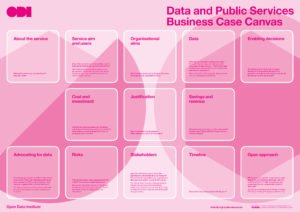
The Data and Public Services Business Case Canvas helps you to develop a business case for data-enabled public services. Advocate for the use of open data in your services by using this tool to create a business case that demonstrates how data can help deliver your organisational objectives and meet user needs in an innovative way.
Data Ethics Canvas
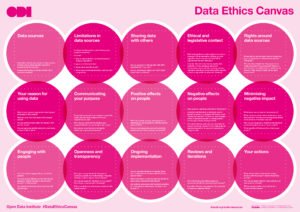
The Data Ethics Canvas helps you to identify potential ethical issues associated with a data project or activity. Use this to ensure that ethical – and legal – use of data is considered from the very beginning of your project, and throughout. It can feed into your business case for using data, or be used on its own.
Data Ecosystem mapping
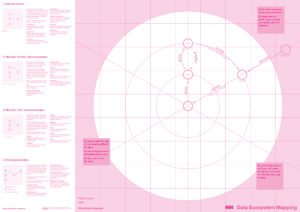
Our guide to Data Ecosystem Mapping helps to identify and plan the technical and organisational relationships needed to deliver a service. Use this guide to bring different stakeholders together to understand the flow of value through your data ecosystem. This can inform your business case, and be a useful tool on its own for project planning and delivery.
Checklist: How to design to scale
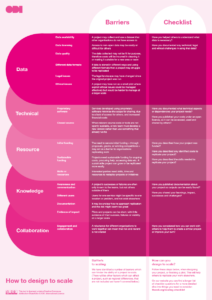
As part of the ODI’s Scaling data innovation project, we are exploring how to help local data-enabled projects scale up or scale out.
Checklist: How to design to scale sets out barriers for scaling with data, and a checklist of things to consider in overcoming them.
The Open Cities Workshop
In order to get the best value from data, cities need to build strong data infrastructure – the people, processes and technology that support the collection, access, use and sharing of data. This is why we created the Open Cities Workshop. In the workshop, we help stakeholders who might not interact with each other on a regular basis to have conversations about how data is used and shared across the city, and to explore the ethical implications of data use in their projects.
‘The ODI Open Cities Workshop is a thought provoking, engaging and inspiring session. It helps explain the tools, techniques and considerations associated with becoming a truly Open City. The session has kick-started our plans for a Data Strategy for the City and spurred us on further to continue pushing hard on our Digital and Open agenda’